| | | OFFLINE | | Post: 19.132
Post: 1.778 | Registrato il: 28/08/2005
Registrato il: 20/01/2009 | Administratore | Utente Veteran | |
|
 BENEDICT XVI'S CHRISTMAS ADDRESS
BENEDICT XVI'S CHRISTMAS ADDRESS
TO THE ROMAN CURIA
Translated from

Dec. 21, 2009
At 11 a.m. today, the Holy Father Benedict XVI received cardinals present in Rome and the members of the Roman Curia and the Governatorate of Vatican city state for their annual Christmas exchange of greetings at the Sala Clementina of the Apostolic Palace.
The Pope's address was preceded by a greeting from Cardinal Angelo Sodano, dean of the College of Cardinals, in behalf of everyone present as well as the Apostolic Nuncios serving the Vatican around the world and the emeritus Nuncios.
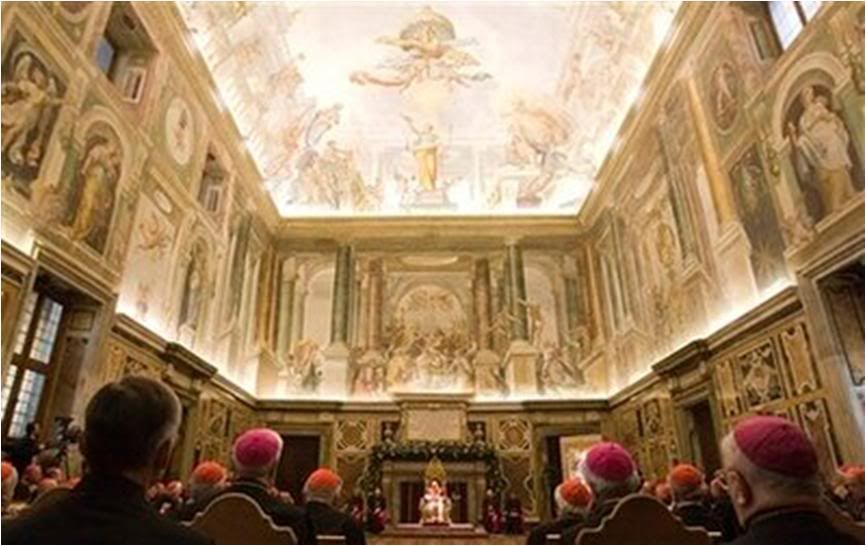
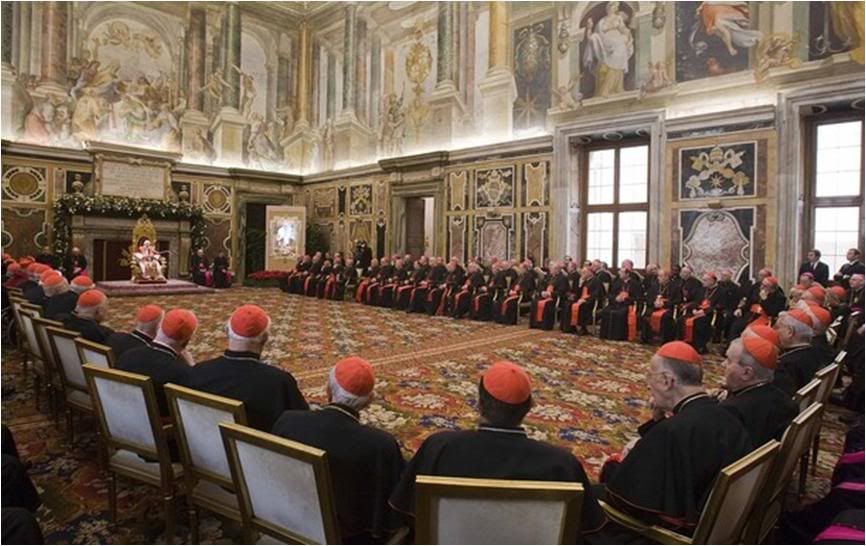 Here is a translation of the Holy Father's address:
Here is a translation of the Holy Father's address:
Eminent Cardinals,
Venerated Brothers in the Episcopate and Priesthood,
Dear brothers and sisters:
The Solemnity of the Holy Nativity, as Cardinal Sodano has just underscored, is for Christians a most special occasion for encounter and communion.
The Baby of Bethlehem whom we adore invites us to feel God's immense love, the God who came down from heaven to be close to each of us and make us his children, part of his own Family.
Even this traditional Christmas appointment of the Successor of Peter with his closest co-workers is a family encounter, which reaffirms our links of affection and communion, in order to be ever more that 'permanent Cenacle' consecrated to spreading the Kingdom of God.
I thank the Cardinal Dean for the kind wishes that he expressed in behalf of the College of Cardinals, the members of the Roman Curia and the Governatorate, as well as the Pontifical Representatives who are profoundly united with us in bringing to the men of our time that Light that was born in the manger at Bethlehem.
In welcoming you all with great joy, I also wish to express my gratitude to everyone for the generous and competent service that you render to the Vicar of Christ and to the Church.
Another year rich with important events for the Church and for the world is coming to an end. With a retrospective look that is full of gratitude, I wish at this time to call attention to some of its key points for the life of the Church.
From the year of St. Paul to the Year for Priests. From the imposing figure of the Apostle of the Gentiles who, having been struck by the light of the Risen Christ and his call, brought the Gospel to the peoples of the world, we have passed to the humble figure of the Curate of Ars, who remained all his life in the small village that was entrusted to him, and who, nonetheless, precisely in the humility of his service, made the reconciliatory goodness of God widely visible to the world.
Both figures manifest the breadth of the priestly ministry, and it also makes evident how great it can be to be humble, and how, through the apparently small service of one man, God can work great things, and can purify and renew the world from within.
For the Church and for me, personally, the year which is ending can largely be seen in the context of Africa. First of all, there was the apostolic trip to Cameroon and Angola.
It was moving for me to experience the great warmth with which the Successor of Peter, Vicarius Christi, was received. The festive joy and cordial affection came to me from the streets and were not simply those for any casual visitor. To encounter the Pope is to experience the universal Church, a community that embraces the world and is assembled by God through Christ - a community not founded on human interests, but which is offered to us from God's loving attention.
Together, we are all the family of God, brothers and sisters by virtue of the one Father - this is the experience we live. We experience the loving attention of God in Christ for us, not as a thing of the past nor of erudite theories, but as a reality that is most concrete here and now.
He himself is in our midst - and one way we can perceive this is through the ministry of the Successor of Peter. Thus we are elevated above routine quotidianity. The heavens open, and this makes every day a feast.
But it is at the same time something lasting. It continues to be true, even in our daily life, that heaven is no longer closed, that God is near, that in Christ, we all belong to each other.
Particularly impressed deeply in my memory were the liturgical celebrations [in Africa]. The celebrations of the Holy Eucharist were truly feasts of faith.
I wish to mention two particularly important elements. First of all, there was the great joy that was shared, which was experienced even through the body, but in a disciplined way that was oriented towards the presence of the living God.
And that in itself already indicated the second element: the sense of sacredness - the mystery of the living God that was present shaped, so to speak, each single gesture. The Lord is present -the Creator, he to whom we all belong, from which we all came, and towards whom are all journeying.
The words of St. Cyprian came spontaneously to my mind, in which he wrote, commenting on the 'Our Father': "Let us remember that we are under the eyes of God who is looking at us. We must be pleasing to the eyes of God, both with the attitude of our body and with the use of our voice" (De dom. or. 4 CSEL III 1 p 269).
And there was that awareness in Africa - that we were under God's regard. This does not bring fear or inhibition, nor external obedience to the rubrics, and much less does it result in showing ourselves off to each other and raising our voices in an undisciplined way.
There was what the Fathers called sobria ebrietas- sober inebriation: to be full of joy that remains moderate and orderly, which unites persons in their interior being, leading them to communitarian praise of God, a praise which at the same time inspires love for our neighbor and reciprocal responsibility for each other.
Of course, part of the trip to Africa was my meeting with our Brothers in the episcopal ministry and the inauguration of the Synod for Africa through the presentation of its Instrumentum laboris [working agenda].
This took place during an evening colloquium on the Feast of St. Joseph, a conversation in which members of the individual national episcopates expressed their hopes and concerns in a very touching way.
I think that the good patron of the home, St. Joseph, who knew personally what it means to ponder, in solitude and hope, the future of his family, heard us lovingly and was with us even during the Synodal assembly itself.
Let us cast a brief look at the Synod. My visit to Africa made evident the theological and pastoral force of the Pontifical Primacy as a point of convergence for the unity of the family of God. And at the Synod, what also emerged strongly was the importance of collegiality - the unity of the bishops, who receive their ministry precisely by entering the community of the Successors of Apostles.
Each one is a Bishop, a successor to the apostles, only insofar as he participates in the community of those who carry on the Collegium Apostolorum in unity with Peter and his Successor.
Just as in the liturgies in Africa, and subsequently, at St. Peter's in Rome, the liturgical renewal by Vatican-II took form in exemplary manner, so also in the communion of the Synod, we experienced the ecclesiology of Vatican-II in a very practical way.
Equally touching were the testimonials that we heard from the faithful of Africa - stories of suffering as well as of concrete reconciliations in the tragedies that have marked the continent's recent history.
The Synodal assembly's theme was "The Church in Africa at the service of reconciliation, justice and peace". This is a theological and especially pastoral issue of great actuality, but it could also be misunderstood as a political subject.
The task of the bishops was to transform theology into pastoral activity - into a very concrete pastoral mission, in which the great visions of Sacred Scripture and of Tradition are applied to the work of bishops and priests in a specific time and place.
In this, however, we must not fall into the temptation of taking politics in hand, and turn ourselves from pastors into political leaders.
Indeed, the most concrete question before which pastors find themselves continually is this: How can we be realistic and practical without arrogating to ourselves a political competence which is not ours?
We could say that this is a problem of positive secularity, practiced and interpreted correctly. This is also a fundamental topic in the encyclical published on the Feast of Saints Peter and Paul, Caritas in veritate, which takes up and ultimately develops the question about the theological and concrete implications of the Social Doctrine of the Church.
Did the Synodal Fathers succeed in finding the rather narrow road between simple theological theory and immediate political action, the Pastor's way? In my brief remarks at the end of the Synodal assembly, I answered this question affirmatively, explicitly and consciously.
Naturally, in the elaboration of the post-Synodal document, we must be careful to maintain this balance and to offer to the Church and society of Africa the contribution expected of the Church by virtue of her mission. I would like to explain this briefly with regard to one point.
As previously mentioned, the theme of the Synod used three big words that are fundamental for theological and social responsibility: reconciliation, justice, peace.
One can say that reconciliation and justice are the two essential prerequisites for peace, and therefore, they define its nature to a certain degree.
Let us limit ourselves to the word 'reconciliation'. A look at the sufferings and pains in recent African history, but also in other parts of the world, shows that unresolved differences that are profoundly rooted can lead, in some situations, to explosions of violence in which all sense of humanity appears to be lost.
Peace can only be realized if one arrives at an interior reconciliation. We can take a positive example from the process of reconciliation that has taken place in Europe after the Second World War.
The fact that since 1945, there have been no new wars in western and central Europe is based firmly and decisively on political and economic structures that are intelligently and ethically oriented, but this could develop only because there were interior processes of reconciliation which made a new coexistence possible.
Every society needs reconciliations in order that there may be peace. Reconciliations are necessary even for good politics, but they cannot be realized only for that reason. They are pre-political processes and must draw from other sources.
The Synod sought to examine deeply the concept of reconciliation as a task for the Church today, calling attention to its various dimensions. The appeal made by St. Paul to the Corinthians possesses a new relevance today: "We are ambassadors for Christ, as if God were appealing through us. We implore you on behalf of Christ, be reconciled to God (2 Cor 5,20).
If man is not reconciled with God, he is also in discord with Creation. And if he is not reconciled with himself - he wants to be something other than he is - and therefore, neither is he reconciled with his neighbor.
Part of reconciliation is the capacity to recognize one's fault and to ask forgiveness - from God, and from one's neighbor. Likewise, part of reconciliation is the readiness to do penitence, the readiness to suffer to the utmost for one's fault and to allow oneself to be transformed.
Reconciliation also consists of gratuitousness, giving freely, of which the encyclical Caritas in veritate speaks repeatedly - it is the willingness to go beyond what is necessary, without counting the costs, going beyond what simple juridical conditions may require.
And that is the generosity of which God himself gave us the example. Let us think of Jesus's words: "If you bring your gift to the altar, and there recall that your brother has anything against you, leave your gift there at the altar, go first and be reconciled with your brother, and then come and offer your gift" (Mt 5,23f).
God, who knew that we were not reconciled, who saw that man had something against him, acted and came to meet us, even if only He was on the side of right. He came to meet us all the way to the Cross in order to reconcile us. That is gratuitousness - the readiness to take the first step.
And so, to begin with, go to the other side, offer reconciliation, take on the suffering of admitting that one was not right.
Never give up this will to reconcile: God has given us the example, and this is one way to become like him, an attitude that we will always need in this world.
We should relearn today the capacity to acknowledge fault, we should shake off the illusion that we are innocent. We should learn the capacity to do penance, to allow ourselves to be transformed - to take a step towards the other and to have God give us the courage and the strength for such a renewal.
In our world today, we should rediscover the Sacrament of penance and reconciliation. The fact that it has disappeared in large measure from the existential habit of Christians is a symptom of loss of truth in confronting ourselves and God - a loss which places our humanity at risk and diminishes our capacity for peace.
St. Bonaventure was of the opinion that the Sacrament of penance was perhaps a sacrament of humanity in itself, a Sacrament that God had instituted in its essence immediately after the Original Sin, with the penance he imposed on Adam - though if it would only attain its complete form in Christ, who is, in person, the reconciliatory power of God, and who had taken our penance upon himself.
In effect, the unity of sin, penitence and forgiveness is one of the fundamental conditions of true humanity, conditions which obtain their complete form in the Sacrament, but which, considering their roots, are part of the essential human being himself.
The Bishops Synod for African therefore was right to include in their reflections the rituals of reconciliation in the African tradition as places of learning and preparation for the great reconciliation that God gives in the Sacrament of penance.
This reconciliation, however, requires the ample 'atrium' (antechamber) of acknowledging sin, and the humility of penitence. Reconciliation is a pre-political concept and a pre-political reality, and precisely because of this, it is of of maximum importance in the political task itself.
If reconciliation is not in the heart, then the political commitment to peace lacks its interior prerequisite. In the Synod, the pastors of the Church committed themselves to that interior purification of man that constitutes the essential preliminary condition to build justice and peace.
But such a purification and interior maturation towards true humanity cannot take place without God.
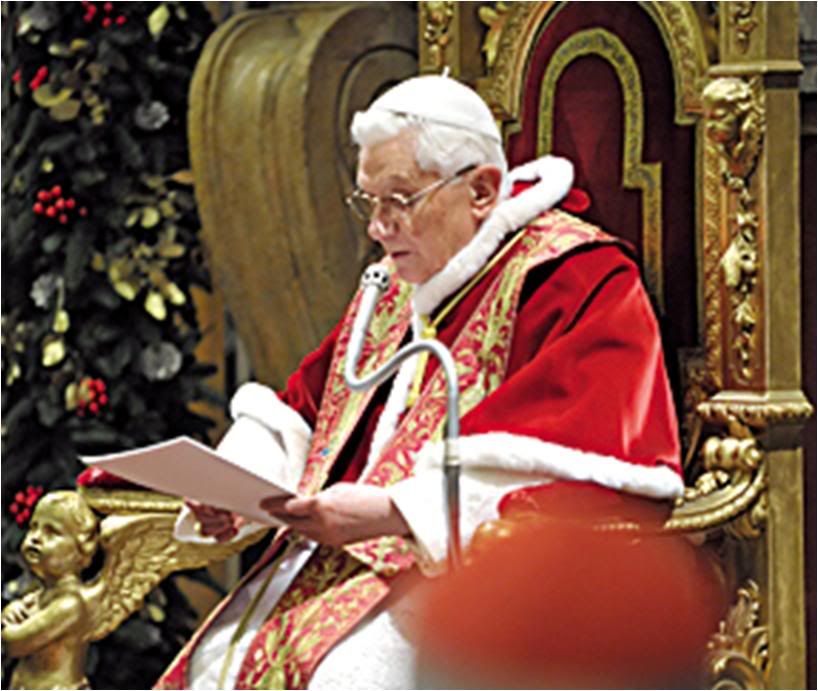
Reconciliation. Again, with this key word I recall the second major trip I made in the year that is ending: the pilgrimage to Jordan and the Holy Land.
In this respect, I wish first of all to thank once again the King of Jordan for the great hospitality with which he received me and accompanied me during my pilgrimage. I am particularly grateful for the exemplary way in which he has committed himself to peaceful coexistence among Muslims and Christians, for his respect for other religions, and for his collaboration in the common responsibility towards God.
Likewise I thank the government of Israel for all that it did so that my visit could take place peacefully and safely. I am particularly grateful for the opportunities granted to me to celebrate two great public liturgies in Jerusalem and Nazareth, at which Christians could openly present themselves as a community of faith in the Holy Land.
Finally, my thanks to the Palestinian authorities who welcomed me with great cordiality, who made it possible for me to offer a public liturgical celebration in Bethlehem, and who also shared with me the sufferings and hopes of their territory.
Everything that one can see in those countries calls for reconciliation, justice and peace.
The visit to Yad Vashem meant an overwhelming encounter with the cruelty of human sin and the hatred of a blind ideology that, without any justification, sent millions of human beings to their death, and with this, ultimately wished to chase God himself from the world, the God of Abraham, of Isaac and of Jacob, and the God of Jesus Christ.
Thus, Yad Vashem is first of all a commemorative monument against hatred, a heartfelt plea for purification and forgiveness, a plea for love.
This very monument against human sin lent greater significance to my visits to the places of the faith and made their unaltered relevance today even more perceptible.
In Jordan, we saw the lowest point of the earth near the river Jordan. How could we not recall the words in the Letter to the Ephesians, according to which Christ "had descended to the lowest regions of the earth" (Eph 4,9).
With Christ, God descended to the ultimate depths of the human being, down to the night of hatred and blindness, to the darkness of man's remoteness from God, in order to kindle the light of his love. He is present in the darkest of nights, and even in hell - as the words of Psalm 139[138] became reality in Jesus's descent.
Thus being in the places of salvation - the Church of the Annunciation in Nazareth, the cave of the Nativity in Bethlehem, the place of Crucifixion on Calvary, the empty tomb that was the testimony of the Resurrection - was like touching God's history with man.
Faith is not a myth. It is real history, whose traces we can touch with our hand. This realism of the faith should serve us particularly well in the travails of the present.
God truly showed himself. In Jesus Christ, he truly became flesh. As the Risen One, he remains a true man, who continually opens humanity to God and is always the guarantee that God is a God at hand. Yes, God lives and relates to us. In all his grandeur, he is nonetheless the God who is near, God-with-us, who continually calls on us: Let yourselves be reconciled with me and among yourselves! - who always imposes the task of reconciliation in our personal and communitarian life.
Finally, I would like to express my gratitude and joy for my visit to the Czech Republic. Before the trip, I was continuously warned that it was the European nation with a majority of agnostics and atheists, in which Christians are only a minority now.
Thus, so much more joyful was the surprise of finding myself surrounded everywhere by such warmth and friendship; that the major liturgies were celebrated in a joyous atmosphere of faith; that my words found sincere attention in the academic and cultural world; that the state authorities gave me great courtesy and and did everything possible to contribute to the success of the visit.
I would be tempted to say more about the beauty of the country and its magnificent proofs of Christian culture, which only help perfect its natural beauty. But more important is the fact that even those persons who consider themselves agnostic or atheist must be believers at heart, like us.
When we speak of a new evangelization, these persons may be horrified. They do not want to be seen as objects of any mission, nor to renounce their freedom of thought and of will.
But the question of God is nonetheless present in them, even if they cannot believe in the concrete nature of his attention to us. In Paris, I had spoken of the quest for God as the fundamental motive that gave birth to Western monasticism, and with it, Western culture.
As a first step in evangelization, we should keep this quest alive. We should see to it that man does not shelve the question of God as an essential question of his existence. Let us work so that man accepts this question and the nostalgia hidden in it.
Here, I am reminded of the words that Jesus cites from the prophet Isaiah, that the temple should be a house of prayer for all peoples (cfr Is 56,7; Mk 11,17). He was thinking of the so-called Court of the Gentiles, that he would clear of all external business so that it could be a free space for Gentiles who wished to pray to the one God, even if they could not take part in the mystery, in whose service the interior of the Temple was reserved.
A space of prayer for all peoples - this meant persons who recognized God from afar, so to speak; those who were discontented with their pagan gods, rite and myths; those who desired what is Pure and what is Great, even if God would remain for them the 'unknown God' (cfr Acts 17,23).
They should nonetheless be able to pray to the unknown God and thus be in relation with the true God, even in the midst of many obscurities.
I think that even today the Church should open a kind of 'Court of the Gentiles' where man can in some way connect themselves to God, even without knowing him, and before they can find access to his mystery, which is served by the internal life of the Church.
To the inter-religious dialog, we must now add a dialog with those for whom religion is an extraneous matter, to whom God is unknown, but who neverhteless do nto wish to remain simply without God, but to approach him even as an unknown God.
And finally, once more, a word about the year for Priests. As priests, we are available to everyone: to those who know God closely and those for whom he is the Unknown. All of us should alwys seek to know him anew and we must continually seek to become true friends of God.
And how can otehrs get to know God if not through men who are friends of God? The deepest nucleus of our priestly ministry is that of being friends of Christ (cfr Jn 15,18), friends of God, through whom even other persons can find closeness to God.
Thus, along with my profound graittude for all the help you have given me throughout the year, this is my Christmas wish: that we may all become increasingly friends of Christ and therefore friends of God, so that in this way we cna be salt of the earth and light in the world.
A blessed Christmas and a prosperous New Year!
As usual, Benedict XVI has packed his Christmas message to the Curia with numerous key ideas for the life of the Church. More than just an annual review of the year or a State-of-the-Church address, it also lays down his priorities for the pastoral agenda in the coming year, even as he shares his personal reflections in his habitually intimate and direct manner. It is another great papal text that can be mined infinitely for its riches.
BENEDICTUS QUI VENIT IN NOMINE DOMINI1
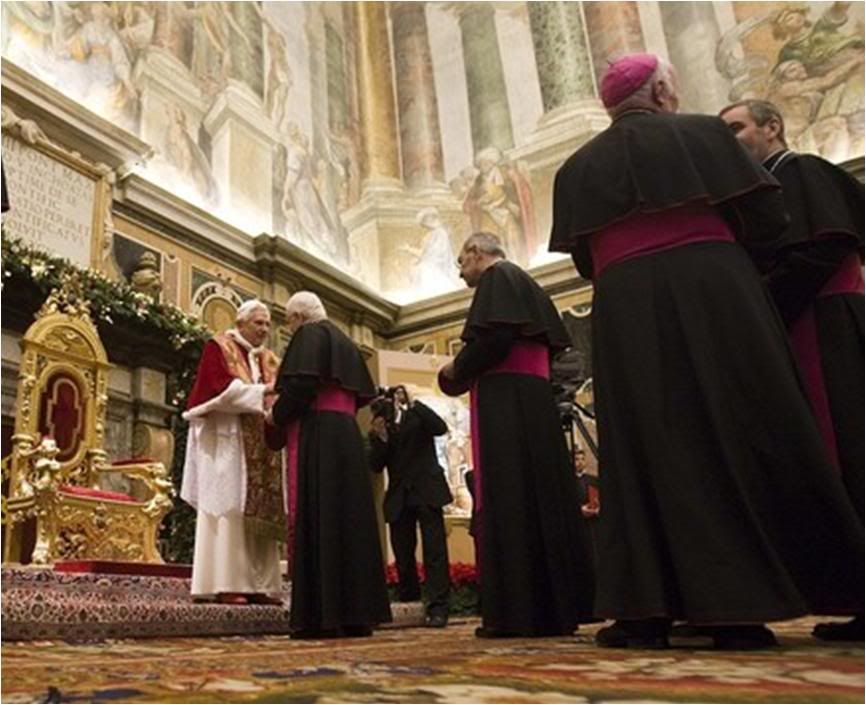
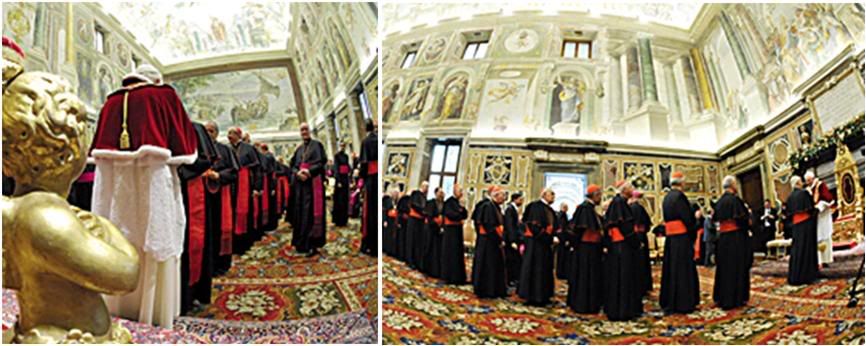
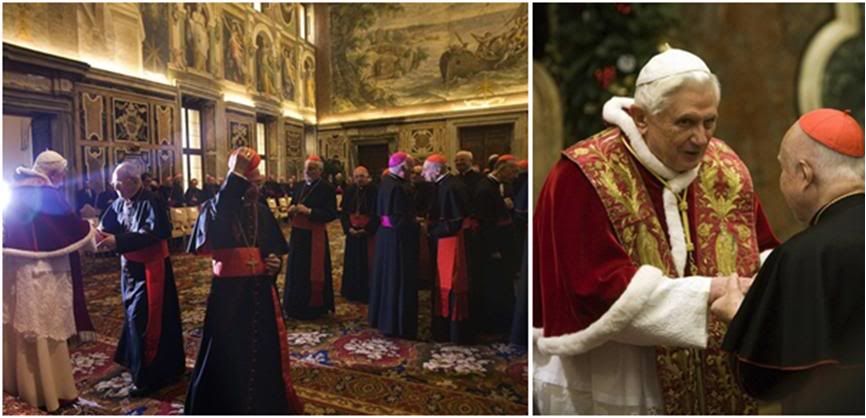

[Modificato da TERESA BENEDETTA 22/12/2009 09:33] |